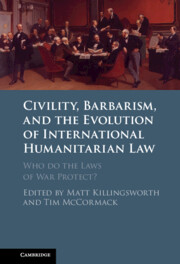 Civility, Barbarism and the Evolution of International Humanitarian Law
Civility, Barbarism and the Evolution of International Humanitarian Law Book contents
- Civility, Barbarism, and the Evolution of International Humanitarian Law
- Civility, Barbarism, and the Evolution of International Humanitarian Law
- Copyright page
- Contents
- Contributors
- Preface and Acknowledgements
- Abbreviations
- 1 Introduction
- 2 Sieges and the Laws of War in Europe’s Long Eighteenth Century
- 3 All’s Fair in Love and War or the Limits of the Limitations
- 4 Cultivating Humanitarianism
- 5 Limits to the Scope of Humanity as a Constraint on the Conduct of War
- 6 The State, Civility, and International Humanitarian Law
- 7 Operationalising Distinction in South Sudan
- 8 Private Military and Security Companies and International Humanitarian Law
- 9 Protecting Warfighters from Superfluous Injury and Unnecessary Suffering
- 10 Blurring the Lines
- 11 A Step Back to Take a Step Forward
- Index
- References
4 - Cultivating Humanitarianism
Moral Sentiment and International Humanitarian Law in the Civilising Process
Published online by Cambridge University Press: 11 January 2024
- Civility, Barbarism, and the Evolution of International Humanitarian Law
- Civility, Barbarism, and the Evolution of International Humanitarian Law
- Copyright page
- Contents
- Contributors
- Preface and Acknowledgements
- Abbreviations
- 1 Introduction
- 2 Sieges and the Laws of War in Europe’s Long Eighteenth Century
- 3 All’s Fair in Love and War or the Limits of the Limitations
- 4 Cultivating Humanitarianism
- 5 Limits to the Scope of Humanity as a Constraint on the Conduct of War
- 6 The State, Civility, and International Humanitarian Law
- 7 Operationalising Distinction in South Sudan
- 8 Private Military and Security Companies and International Humanitarian Law
- 9 Protecting Warfighters from Superfluous Injury and Unnecessary Suffering
- 10 Blurring the Lines
- 11 A Step Back to Take a Step Forward
- Index
- References
Summary
Until quite recently, international relations theory neglected the role of emotions. This chapter surveys the rehabilitation of emotions and moral sentiment in political and international relations theory with a view to examining the cultivation of sympathy as a normative and historical condition of international humanitarian law as a ‘civilising process’. The chapter argues that, as part of a broader ‘civilising process’ to alleviate unnecessary human suffering, moral sentiment has been an indispensable, if ambivalent, factor in the historical pursuit of humanitarian action. The chapter argues that the modern codification of international humanitarian law is predicated on the cultivation of moral sentiments such as sympathy and compassion being extended to those injured or killed on the battlefields.
Keywords
- Type
- Chapter
- Information
- Civility, Barbarism and the Evolution of International Humanitarian LawWho do the Laws of War Protect?, pp. 61 - 84Publisher: Cambridge University PressPrint publication year: 2024


